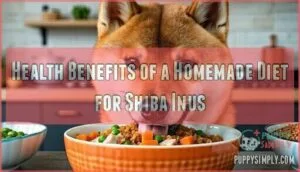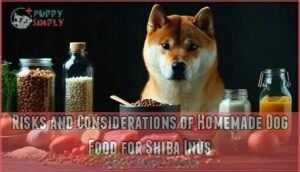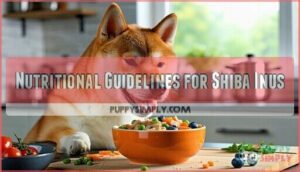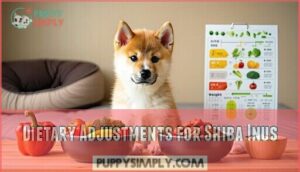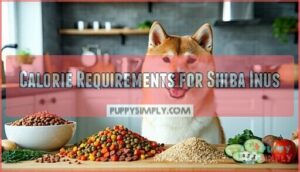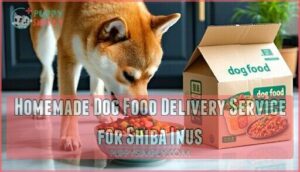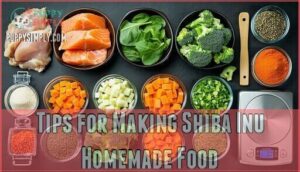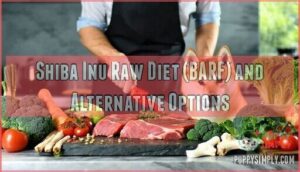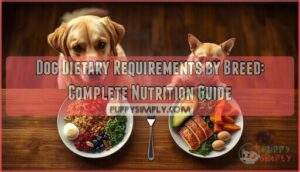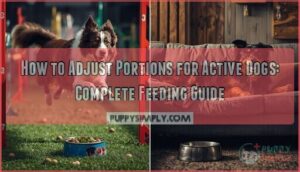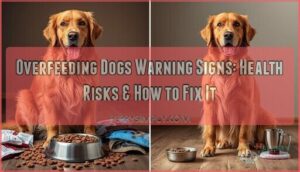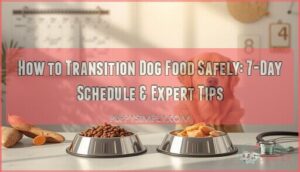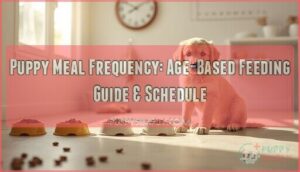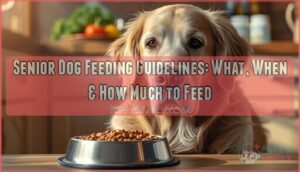This site is supported by our readers. We may earn a commission, at no cost to you, if you purchase through links.
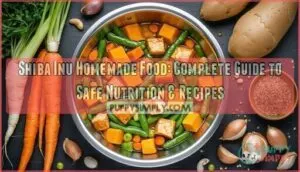
You’ll avoid mystery ingredients and fillers found in commercial kibble while tailoring meals to your Shiba’s specific needs.
Start with lean proteins like chicken or turkey, add healthy carbs such as sweet potatoes, and include vegetables like carrots or green beans.
Balance is essential – your Shiba needs the right mix of protein, fats, and vitamins to thrive.
Always avoid toxic foods like onions, garlic, and chocolate.
Getting the proportions right isn’t guesswork, and there are specific techniques that make meal prep easier while ensuring your furry friend gets restaurant-quality nutrition at home.
Table Of Contents
- Key Takeaways
- Benefits of Homemade Dog Food for Shiba Inus
- Health Benefits of a Homemade Diet for Shiba Inus
- Risks and Considerations of Homemade Dog Food for Shiba Inus
- Nutritional Guidelines for Shiba Inus
- Dietary Adjustments for Shiba Inus
- Calorie Requirements for Shiba Inus
- Homemade Dog Food for Shiba Inu Puppies
- Homemade Dog Food Delivery Service for Shiba Inus
- Tips for Making Shiba Inu Homemade Food
- Foods to Avoid for Shiba Inus
- Shiba Inu Raw Diet (BARF) and Alternative Options
- Frequently Asked Questions (FAQs)
- What food is best for a Shiba Inu?
- What are the best ingredients to put in homemade dog food?
- What not to feed a Shiba Inu?
- Can shiba inus eat cooked eggs?
- How often should I transition my Shiba Inu to homemade food?
- Can I mix homemade and commercial dog food together?
- What kitchen equipment do I need for meal prep?
- How do I calculate exact portion sizes daily?
- Should I cook all ingredients or serve some raw?
- Conclusion
Key Takeaways
- You’ll need precise nutritional balance – homemade diets often lack essential nutrients, so work with your vet to create recipes that include proper protein (30%), fat (15-18%), and necessary supplements like calcium and vitamins.
- Start with quality ingredients but avoid toxic foods – use lean proteins like chicken or turkey, healthy carbs like sweet potatoes, and safe vegetables, but never include chocolate, onions, garlic, grapes, or xylitol, which can poison your dog.
- Puppies require special consideration – they need 2-3 times more calories per pound than adults, higher protein content (22-32%), and frequent meals (3-4 times daily) to support their rapid growth and development.
- Gradual transition and proper storage are essential – switch from commercial food over 7-10 days by gradually increasing homemade portions, and store prepared meals safely in airtight containers with proper labeling and freezing for up to three months.
Benefits of Homemade Dog Food for Shiba Inus
Making your own dog food gives you complete control over what your Shiba Inu eats every day.
You’ll know exactly which ingredients go into each meal, and you can avoid the preservatives and fillers found in many commercial dog foods.
Nutritional Benefits of Homemade Dog Food
Fresh ingredients provide your Shiba Inu with superior ingredient quality compared to processed kibble.
Homemade dog food enhances digestive health through natural nutrients that support coat improvement and stable energy levels.
You’ll notice better allergy management when controlling what goes into your dog’s bowl.
This shiba nutrition approach delivers nutritional benefits that commercial foods often lack, making healthy shiba food achievable through your homemade shiba inu diet.
Risks and Considerations
Despite its benefits, homemade dog food carries significant risks for your shiba inu diet.
Recipe imbalance affects over 90% of homemade meals, causing nutritional deficiencies in essential vitamins and minerals. Ingredient sourcing varies seasonally, making consistent nutrition difficult.
Perfect nutrition becomes near impossible without professional guidance and seasonal ingredient challenges.
The time commitment for proper meal prep is substantial. Without vet consultation, you risk foodborne illness from improper handling and toxic ingredients.
Many owners underestimate shiba allergies and preparation complexity. Recipes from a veterinary nutritionist are more likely to be nutritionally balanced.
Homemade Puppy Food Requirements
Shiba Inu puppies need special attention when you’re making homemade puppy food.
Their growing bodies require different nutrition than adult dogs. Here’s what matters most:
- Puppy Calorie Needs: Feed 2-3 times more calories per pound than adults
- Growth Stage Nutrients: Higher protein (22-32%) and fat (8-22%) content
- Recipe Adjustments: Smaller kibble size and softer textures for tiny mouths
- Supplementing Puppy Food: Add calcium and DHA for brain development
- Feeding Frequency: 3-4 meals daily until 6 months old
Puppy nutrition requires careful planning since neutering puppies affects metabolism.
Health Benefits of a Homemade Diet for Shiba Inus
When you make your own food for your Shiba Inu, you can control every ingredient that goes into their bowl.
This means better digestion, shinier coats, and more energy for your active pup who loves those daily walks around the neighborhood, resulting in a healthier lifestyle.
Nutritional Requirements for Shiba Inus
Understanding your Shiba Inu’s nutritional requirements forms the foundation of successful homemade dog food preparation.
These spirited dogs need six essential nutrients: protein, carbohydrates, fats, minerals, vitamins, and water.
Protein sources like chicken, beef, and fish should comprise at least half their meals.
Fat intake supports their energy levels, while proper hydration needs guarantee healthy digestion.
Supplementation may be necessary for complete balanced nutrition.
Some owners prefer hydrolyzed soy protein for easier digestion.
Benefits of Homemade Diet
Making your own Shiba Inu homemade food reveals powerful advantages that transform your dog’s health and happiness.
This approach gives you complete control over what goes into their bowl.
Key benefits include:
- Ingredient Quality – You choose fresh, whole foods without fillers or by-products
- Portion Control – Tailor serving sizes to prevent obesity and maintain ideal weight
- Allergy Management – Eliminate problem ingredients causing skin issues or digestive upset
- Freshness Advantage – Serve meals packed with natural vitamins and active enzymes
- Bonding Opportunity – Strengthen your relationship through meal preparation rituals
The nutritional benefits shine through improved coat color and energy levels.
Risks of Homemade Diet
While homemade meals offer benefits, they carry significant nutritional risks that responsible pet owners must understand.
Nutrient Imbalance tops the list of concerns when recipes lack proper proportions. Recipe Inadequacy affects 48% of homemade diets according to studies.
Ingredient Safety becomes critical as dangerous substances like onions can poison your Shiba. Bacterial Contamination from raw ingredients poses health threats.
Supplementation Needs often go unmet without veterinarian guidance, creating deficiencies that compromise your dog’s wellbeing over time.
| Risk Category | Common Issues |
|---|---|
| Nutritional Deficiencies | Missing vitamins, minerals, amino acids |
| Food Safety | Raw meat bacteria, toxic ingredients |
| Recipe Problems | Incorrect proportions, incomplete nutrition |
| Long-term Health | Bone disorders, organ dysfunction |
Risks and Considerations of Homemade Dog Food for Shiba Inus
While homemade dog food offers many benefits for your Shiba Inu, it comes with important risks you need to understand before making the switch.
Without proper knowledge of canine nutrition, you could accidentally create meals that lack essential nutrients or include harmful ingredients that could damage your dog’s health.
Nutritional Risks and Considerations
While homemade diets offer health benefits, they come with significant nutritional risks that require careful attention.
Recipe imbalance affects over 90% of homemade dog foods, lacking essential nutrients your Shiba Inu needs. Many owners consider hydrolyzed protein options for easier digestion.
Key nutritional considerations include:
- Ingredient sourcing variations that affect nutrient content unpredictably
- Preparation errors leading to calcium-phosphorus imbalances up to 1:10 ratios
- Supplement needs often overlooked, causing vitamin deficiencies
- Veterinary guidance necessity for balanced meals and ingredient safety
Essential Nutrients and Supplements
Your Shiba Inu homemade food needs proper protein sources like chicken, beef, and fish for muscle health.
Fat balance from omega-3 oils supports skin and coat. Bone health requires calcium supplements like eggshell powder.
Hydration needs include high-moisture foods and fresh water. Vitamin supplements fill nutritional gaps that homemade diets often miss.
These canine supplements guarantee your dog gets complete nutrition. Puppies especially benefit from supplements that support cognitive development.
Homemade Food for Puppies
Feeding puppies homemade dog food requires extra caution since over 95% of homemade puppy food recipes lack essential nutrients.
Puppy nutrition demands precise calcium-phosphorus ratios and proper supplementation risks assessment.
Growth stage needs differ substantially from adult dogs, requiring recipe adjustments for puppy portion sizes and weaning strategies to prevent developmental issues in your growing Shiba Inu.
Homemade food offers customizable nutritional content, allowing owners to tailor meals with essential nutrients and consider customizable options for their pets, ensuring a healthy diet.
Nutritional Guidelines for Shiba Inus
Your Shiba Inu needs six Essential Nutrients: protein, carbohydrates, fat, minerals, vitamins, and water.
Adult dogs require 518-649 daily calories, with proper Calorie Intake varying by weight and activity level.
Key nutritional requirements include 30% protein and 15-18% fat for energy and muscle health. Supplement Needs may include calcium from eggshell powder and iodine from kelp.
Fresh ingredients support Hydration Importance through high-moisture foods. Dietary Adjustments depend on age, health conditions, and activity levels.
With their ancient Japanese roots, understanding breed-specific needs is vital. A balanced diet with quality proteins, healthy fats, and proper portions guarantees your Shiba Inu homemade food meets all dietary guidelines.
Dietary Adjustments for Shiba Inus
Your Shiba’s dietary needs change throughout their life.
Age-Related Changes affect how much food they need, while Activity Level determines their energy requirements.
Health Conditions like shiba allergies or sensitive stomach require special shiba inu recipes.
Watch for Coat Changes that signal nutritional gaps.
Weight Management becomes harder as dogs age.
Senior Shibas need fewer calories but more joint support.
Active dogs need extra protein.
Dog allergies often develop over time, requiring ingredient swaps.
Monitor your pup’s body condition monthly and adjust portions accordingly to manage Health Conditions.
Calorie Requirements for Shiba Inus
Understanding your Shiba Inu’s calorie requirements keeps your dog healthy and happy. An adult Shiba Inu typically needs 300-600 calories daily, with most dogs requiring around 400 calories. You can calculate this using the formula: 30 × weight in kg + 70.
Puppy Calorie Needs are higher, requiring 2-3 times more calories than adults to support growth. Adult Calorie Needs vary by activity level – active dogs need nearly double the calories of couch potatoes. Senior Calorie Needs decrease as metabolism slows.
Activity Level Impact matters most. Working dogs need 2-5 times more calories than sedentary pets. Spaying or neutering reduces needs by 10-20%.
For Weight Management, monitor your Shiba’s body condition regularly. Use a dog calorie calculator to determine precise needs. Split daily calories into two meals following a consistent Shiba feeding schedule. Shiba weight management requires adjusting portions based on your dog’s changing needs throughout life.
Homemade Dog Food for Shiba Inu Puppies
Growing puppies need extra care regarding homemade dog food. Your Shiba Inu puppy requires more calories and nutrients than adult dogs to support their rapid development.
Key Puppy Growth Stages requirements:
- Weaning Puppy Food (4-6 weeks) – soft, moistened textures
- Early growth (2-4 months) – higher protein and fat content
- Rapid development (4-8 months) – increased Recipe Calorie Count
- Adolescent stage (8-12 months) – balanced nutrition maintenance
- Supplementing Puppy Diets – calcium and phosphorus for bone growth
Feed your puppy 3-4 times daily with appropriate Puppy Food Texture. Make certain each meal meets puppy food requirements through careful ingredient selection. Monitor weight gain closely during different Puppy Growth Stages to adjust portions accordingly.
Homemade Dog Food Delivery Service for Shiba Inus
Busy pet parents often find themselves torn between wanting the best nutrition for their Shiba Inu and lacking time for meal prep.
Homemade dog food delivery services offer the perfect middle ground, combining fresh ingredients with professional expertise.
These services provide customized meal plans suited to your Shiba Inu’s specific needs.
Companies like The Farmer’s Dog and JustFoodForDogs employ veterinary nutritionists who design recipes based on your dog’s age, weight, and activity level.
Recipe customization allows you to select preferred proteins and accommodate allergies or sensitivities.
Service cost typically ranges from $2-12 daily for small breeds like Shiba Inus.
While more expensive than kibble, the premium reflects human-grade ingredient sourcing and personalized preparation.
Most services offer delivery radius coverage nationwide, with freshness guarantee through frozen packaging.
Pre-portioned meals arrive ready to serve, eliminating guesswork about portion sizes.
This convenience helps prevent obesity while ensuring balanced nutrition.
Many companies provide flexible subscription plans and customer support for ongoing dietary adjustments.
Tips for Making Shiba Inu Homemade Food
Looking beyond delivery services, making your own Shiba Inu homemade food requires careful planning and the right approach. Success depends on following proven methods that keep your pup healthy and happy.
Here are five key tips for creating safe, nutritious meals:
- Ingredient Sourcing – Buy fresh, high-quality proteins like chicken, beef, and fish from trusted suppliers. Choose organic vegetables when possible.
- Recipe Balancing – Include multiple protein sources, organ meats, and vegetables. Add eggshell powder for calcium and kelp for iodine to meet nutritional needs.
- Portion Control – Measure ingredients by weight, not volume. Adult Shiba Inus need about 1/2 to 1.5 cups daily, split between two meals.
- Safe Storage – Cool food completely before storing. Use airtight containers and label with dates. Freeze meals for up to three months.
- Vet Consultation – Work with your veterinarian to confirm recipes meet your dog’s specific needs and health requirements.
Batch cooking saves time while maintaining consistency in your shiba food guide. Consider essential vitamin supplements to guarantee a balanced diet.
Foods to Avoid for Shiba Inus
Smart preparation includes knowing which foods can harm your Shiba Inu. Toxic ingredients like chocolate, grapes, and onions pose serious health risks. Even small amounts can trigger severe reactions or organ failure.
Common allergy triggers affect many Shiba Inus. Wheat, corn, and certain proteins often cause digestive upset or skin problems. Watch for breed sensitivities when introducing new foods. Addressing potential dog food sensitivities is essential for maintaining their health.
| Toxic Ingredients | Health Risk |
|---|---|
| Chocolate, caffeine | Heart problems, seizures |
| Grapes, raisins | Kidney failure |
| Onions, garlic | Anemia, blood damage |
| Xylitol sweetener | Liver failure |
| Macadamia nuts | Weakness, tremors |
Safe alternatives exist for most dangerous foods. Replace grapes with blueberries. Use sweet potatoes instead of onions for flavor. Always research ingredients before adding them to homemade recipes.
Shiba Inu Raw Diet (BARF) and Alternative Options
The BARF diet offers your Shiba Inu a protein-rich foundation that mirrors their ancestral eating patterns.
This raw feeding approach typically includes 70% muscle meat, 10% raw bone, and various organs to create nutritionally complete meals.
Consider these key safety concerns when switching to raw dog food:
- Pathogen risks – Raw meat can harbor Salmonella and Listeria
- Nutritional imbalances – Homemade raw recipes need careful planning
- Gradual switch – Switch slowly to prevent digestive upset
Alternative diets include cooked homemade meals, freeze-dried raw options, or high-pressure pasteurized products.
These BARF alternatives reduce bacteria exposure while maintaining fresh ingredient benefits.
Always consult your vet before making dietary changes to confirm your Shiba Inu’s specific needs are met.
Frequently Asked Questions (FAQs)
What food is best for a Shiba Inu?
Don’t put all your eggs in one basket—balanced homemade food works best for your Shiba Inu.
You’ll want high-quality protein, healthy fats, and fresh vegetables combined properly to meet their specific nutritional needs.
What are the best ingredients to put in homemade dog food?
You’ll want high-quality protein like chicken, beef, or fish as your foundation. Add healthy carbs from brown rice or sweet potatoes, plus vegetables like carrots and spinach for vitamins.
What not to feed a Shiba Inu?
Never feed your Shiba Inu chocolate, grapes, raisins, onions, garlic, xylitol, or avocado. These foods can cause serious poisoning, kidney damage, or death in dogs.
Can shiba inus eat cooked eggs?
Like eggs for breakfast, cooked eggs are perfectly safe for your Shiba Inu.
They’re actually nutritional powerhouses packed with protein and healthy fats.
Just skip the seasoning and serve them plain.
How often should I transition my Shiba Inu to homemade food?
Switch your Shiba Inu to homemade food gradually over 7-10 days.
Start with 25% homemade food mixed with 75% current food, then increase the homemade portion by 25% every 2-3 days until you’ve completely switched.
Can I mix homemade and commercial dog food together?
Yes, you can mix homemade and commercial dog food together.
This approach provides nutritional balance and convenience.
Start with small portions of homemade food mixed with commercial food, gradually adjusting ratios based on your Shiba Inu’s preferences and dietary needs.
What kitchen equipment do I need for meal prep?
Studies show that 48% of homemade dog diets have ingredient measurement issues.
You’ll need basic tools: large mixing bowls, measuring cups, food scale, sharp knives, cutting boards, and freezer-safe storage containers for efficient meal prep.
How do I calculate exact portion sizes daily?
Calculate your Shiba Inu’s daily calories by multiplying their weight by 30, then adding Divide this total by your homemade food’s calories per cup to determine exact portions needed.
Should I cook all ingredients or serve some raw?
Nearly 48% of homemade dog diets lack proper ingredient balance, making cooking decisions vital.
You should cook most ingredients thoroughly for safety, but certain items like fish oil can remain raw for maximum nutritional benefit.
Conclusion
Like a master chef who knows exactly how much salt transforms a dish, creating shiba inu homemade food requires precision and knowledge.
You’ve learned the essential nutritional requirements, safe ingredient combinations, and proper preparation techniques.
Your Shiba deserves meals that support their unique energy needs and health requirements.
Remember to consult your veterinarian before making major dietary changes.
With careful planning and attention to detail, you’ll provide your furry companion with nutritious homemade meals they’ll love.
- https://www.prodograw.com/raw-feeding-guide/shiba-inu-feeding-guide/
- https://iheartdogs.com/ideal-diet-for-shiba-inus-the-ultimate-shiba-inu-feeding-guide/
- https://www.allrecipes.com/recipe/140286/homemade-dog-food/
- https://myfirstshiba.com/must-haves-fresh-shiba-diet/
- https://www.reddit.com/r/shiba/comments/1hx9yxd/anyone_here_feeding_their_shiba_homemade_meals/

